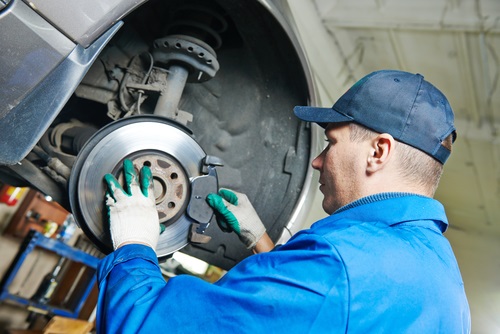Regular brake inspection is important if you want to ensure that you are travelling on the roads safely. The National Highway Traffic Safety Administration (NHTSA) statistics show that between 30,000 and 40,000 people are killed in traffic accidents every year. While most of these accidents are caused by impaired drivers and driver error, mechanical failures do play a role. According to this NHTSA congressional report, in accidents where mechanical failure is indicated, brake failure is one of the most common causes.
You can’t do much about the person next to you who’s busy texting, the one behind you driving with bad brakes, or the speeder that just passed you, except try to stay out of their way. But you can control the maintenance of your own vehicle, so why risk it?

Why you shouldn’t wait to get a brake inspection
It’s true today’s vehicles are safer than ever. But even the best safety features won’t make up for lack of regular maintenance. August is Brake Safety Awareness Month so take the opportunity to get your brakes checked if you’ve been putting it off.
Properly working brakes are vital to the safe operation of your car. According to Autos.com the average weight of a passenger car is 3,000 to 5,000 lbs. Minivans, SUV’s and pick-up trucks weigh even more. So your brakes have to work hard to stop your vehicle safely, even when you’re traveling at slower speeds. When you consider all the work your brakes do, it is easy to see why they can go from bad to worse really quickly if you’re already experiencing a problem.
As with other parts of your car, the brakes can’t last indefinitely. Your brake system contains metal parts that can rust or corrode. Rubber and plastic parts that can deteriorate and cause seals to leak. And moving parts that can wear or get stuck. A severely worn part is far more likely to fail completely and cause an accident. Since your brakes wear out over time, you may not notice much of a change in performance at first. Regular brake inspections can find a small problem before it becomes a big problem.
Signs of a brake problem
Some of the signs of a brake problem are obvious. Other symptoms can also be caused by other problems, and your mechanic will need some additional information to confirm that it is indeed a brake problem.
- Noise – Squeaking, squealing, screeching and grinding noises are most common.
- Longer stopping distances
- “Spongy” or soft feeling when pressing the brake pedal. Brakes require too much pressure to engage, and pedal may go almost or completely to the floor.
- Brake warning light is on
- Brakes that engage at the slightest touch
- Grabbing feeling or car pulling to one side
- Vibrating or pulsating brake pedal
- An ABS light that is constantly on
If you’re experiencing any of these symptoms with your car, talk to a mechanic to schedule service. Don’t forget, brake inspections can save you money too. Small problems are usually cheaper and easier to fix than big ones. It’s better to spend a little money than pay with your life.
Everyone gets super busy every now and again. Sometimes our lives are so full, we let those little things get away from us. No matter how busy your life is, one thing you shouldn’t over look is regular maintenance on your car. That includes having the brakes inspected regularly. Contact us as it may save your life!

